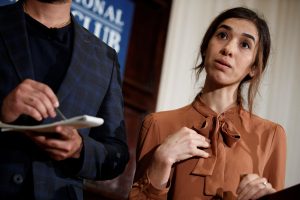
Washington, Oct 8 (EFE).- The Iraqi Nadia Murad, co-recipient of the 2018 Nobel Peace Prize, said here Monday that she feels a responsibility to speak up for others who have suffered as she did while a sex slave for Islamic State.
“I’m committed to being the voice of those who have no voice,” she said in a speech at the National Press Club in Washington, her first public appearance since last Friday’s announcement by the Nobel committee.
Murad said that receiving the prize is an honor and will help her cause, which includes reporting the genocide of the Yazidi community and sexual violence in armed conflicts, as well as restoring the lives of victims of these tragedies.
“It is an honor to share it with the Yazidis, Iraqis, Kurds and other persecuted minorities and all victims in every corner of the world, particularly those who have suffered sexual violence,” the 25-year-old activist said.
She called on the international community to work with her.
“I call on all governments to join me in fighting genocide and sexual violence. The world must take responsibility for ending sexual violence,” Murad said.
In that sense, she said the focus should be on making sure criminals pay for their crimes and that justice is done for the victims.
On Aug. 3, 2014, Islamic State gained access to the Iraqi region of Sinjar, where Murad was born, grew up and became one of the 3,000 girls and women who were sold and sold again as sex slaves, a humiliation she had to endure for three months until she managed to escape.
The goal of Islamic State was to exterminate the Yazidis, a Kurdish minority considered infidels and who have suffered 74 genocides throughout their history.
Murad shares the 2018 Nobel Peace Prize with Congolese Dr. Denis Mukwege, who works for the recovery of women raped by armed combatants.
